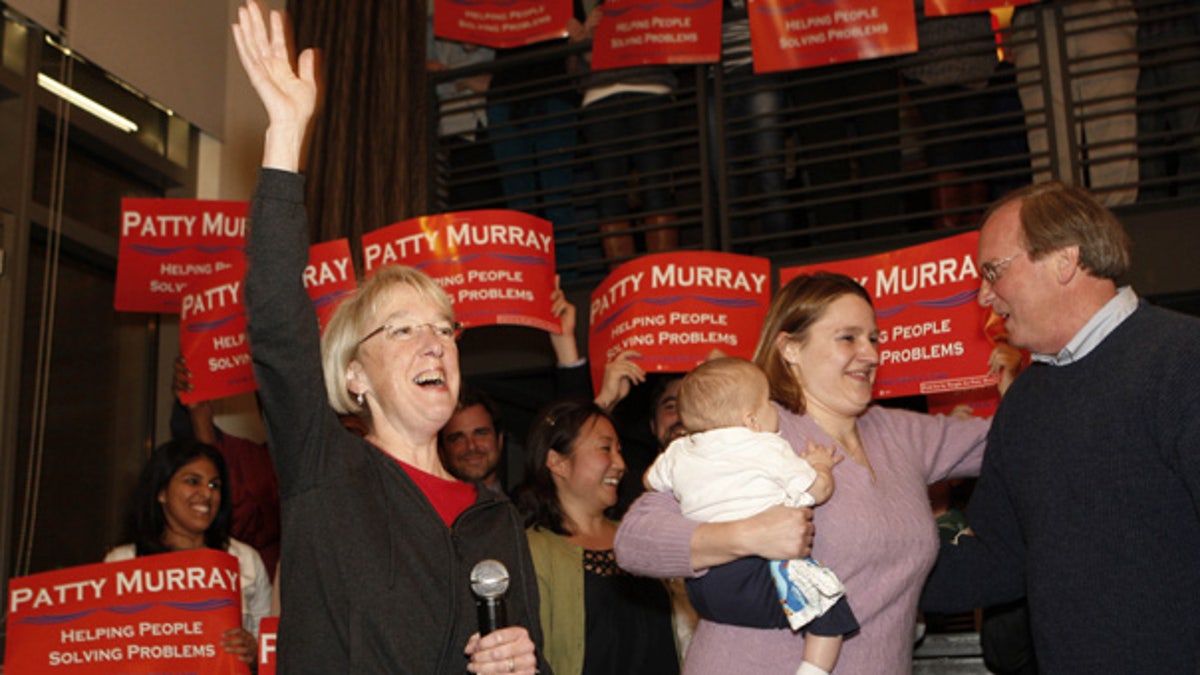
Nov. 4: Sen. Patty Murray celebrates with supporters in Seattle after Republican challenger Dino Rossi conceded. (AP)
OLYMPIA, Wash. -- Washington U.S. Sen. Patty Murray seized a fourth term Thursday, surviving voters' backlash against Democrats nationally and weeks of relentless GOP campaign attacks on her voting and federal spending record.
Murray's victory over Republican Dino Rossi, after three days of tallying, preserves breathing room for the Senate's shrunken Democratic majority. Republicans made inroads there Tuesday and took control of the House for the rest of President Barack Obama's first term.
Her win was secured Thursday as tallies pushed her lead to about 46,000 votes out of more than 1.8 million counted, or about 51 percent to 49 percent. About three-quarters of the expected ballots had been counted in unofficial returns.
Hundreds of thousands of ballots still await processing, but an Associated Press analysis determined Murray's lead would be insurmountable.
Rossi issued a statement Thursday evening saying he had called Murray to congratulate her. He called on the new-look Congress to focus on the economy and strive for cooperation.
"The lesson I leave you with is one we learned as kids: We're all in this together. If Washington, D.C., doesn't act to help the economy grow and solve this massive spending and debt, it's going to hurt us all," Rossi said.
Murray's campaign offered a strong defense of her ability to win federal spending, even in a year when economic jitters threatened to derail that traditional strength for sitting senators. The list of projects she touted was seemingly endless: Bridges, highways, veterans' hospitals, dams, port construction and more.
Murray also sought to paint Rossi as a friend of big business, pointing to his call to repeal the Democrats' new Wall Street regulations.
Rossi's campaign was relentlessly focused on Murray's spending record, including the sometimes intertwining paths of Murray's campaign contributors and her "earmarks" for pet projects. He argued that the one-time underdog candidate had changed over 18 years in Washington, D.C., and had to be replaced to secure the nation's economic future.
The campaign was expensive and smothered Washington airwaves with advertising -- much of it sharply negative in tone. Murray spent nearly $15 million through September to Rossi's roughly $2.5 million, but a flood of outside money helped Rossi keep up.
It was Rossi's third statewide loss in six years. He nearly won the 2004 governor's race, losing by just 133 votes after a long court fight. Rossi lost a second gubernatorial race in 2008.
Associated Press exit polling showed Murray won strong support from women, suburban voters and those who considered themselves moderates.
Rossi chipped away at Murray's base of independents, urbanites, people aged 30-49 and white male voters, but the Democrat gained some ground with rural voters and people whose family income is between $30,000 and less than $50,000, compared to 2004 when she ran for re-election.
The poll results showed Murray did well among voters who had a more positive view of the federal government, who felt better about their financial situation compared to two years ago and who wanted Congress to work on spending to create jobs over reducing the budget deficit or cutting taxes.
The survey of Washington voters was conducted for AP by Edison Research. It included preliminary results from a survey of 1,129 voters who voted early or absentee and were interviewed by landline or cell phone from Oct. 22 through Oct. 31. Results for the full sample were subject to sampling error of plus or minus 3 percentage points, higher for subgroups.




